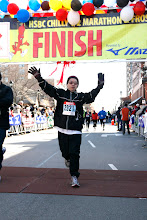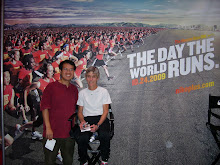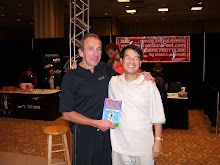Massive study takes a long look at mortality and the marathonJune 3, 2012
By Michael Doyle
from: http://runningmagazine.ca/2012/06/sections/news/massive-study-takes-a-long-look-at-mortality-and-the-marathon/
At last Sunday’s Ottawa Race Weekend spectators and organizers were witness to what has become the greatest fear at a road race: a runner collapsing near the finish line.
Chi-son Do, a 25-year-old Montrealer competing in the half-marathon, lost consciousness and immediately collapsed with only 20 meters to go before the finish line. Luckily, there were two doctors that emerged from the crowd that immediately attended do Do, after what the Ottawa Citizen describes as a face-first fall and subsequent motionlessness, where the two doctors struggled to find a pulse and ultimately began performing CPR in an attempt to revive the runner.
The above scene has seemingly become a weekly occurrence during peak marathon periods in the spring and fall. And, of course, this has led both mainstream media outlets and the public at large to wonder whether or not long-distance running is indeed good for you.
This very question, and curiosity about the overall state of long distance running in America, led researchers in the department of medicine at Johns Hopkins University in Baltimore to survey a massive amount of data regarding marathons and the deaths that have occurred during and immediately following marathons over a ten year period.
What the researchers found after looking at data between 2000-2009 was that, although the number of marathon participants grew quite a bit over the course of the decade (from just shy of 300,000 in 2000 to nearly 475,000 in 2009), the comparative rate of deaths during a marathon did not rise. Also, the average finishing time of marathon runners did not significantly change (from 4:34:47 in 2000 to 4:35:28 in 2009), which would suggest that culturally there has been a stasis in terms of how long distance running is approached in the United States. The running population has not significantly improved, nor have they taken a step backwards.
Because the nature of deaths aren’t often reported publicly by hospitals, the researchers of the study found a novel and surprisingly thorough means of gathering data specific to marathons: the media. Unsurprisingly, more or less every single death or serious medical situation that occurs at a running event, or within a 24 hour window after a race is reported by some form of media outlet. Often, the tragic yet singular situation then spreads like wildfire across social media circles, with perverse curiosity and reactionary scorn by non-runners. The running community then finds itself revisiting the seemingly age-old question: is long distance running good for you? Lately, it seems that this question has been modified even further: is long distance running in fact bad for you?
The results of this massive survey in the United States revealed that a grand total of 28 people died either at or within a 24-hour window of running a marathon between 2000-2009. Of those 28 people, the median age was 41.5 years old. Exactly 50% (14) were under 45 years old. Of those over 45, 13 of the 14 died of heart disease related issues. Those under the median age died of a variety of issues, including cardiac arrest.
Also of note, and in what seems to be the takeaway from the study, the mortality rate of marathon participants did not significantly change over the 10 year period and remains insignificantly low.
The Johns Hopkins study seems to reveal what the vast majority of runners everywhere have long believed (or, rather, hoped): that training for and running a marathon is no more dangerous today than it was when the event was significantly less popular a decade ago. Moreover, one could read from this study that the only thing that has gotten out of hand over the last 10 years has been the sensationalistic media attention that a death during a marathon attracts and the desire for a grand narrative that is just simply not there. The numbers don’t lie, as the saying goes.
In the end, Mr. Do was revived and after an extended stay at an Ottawa hospital and a battery of heart related tests that revealed no stress on the heart or pre-existing heart condition, he was released. The Ottawa Citizen reports that Do is at home resting and feeling good, yet disappointed that he was not able to finish the race. The probable cause of Mr. Do’s terrifying collapse that made national news during Ottawa race weekend proved to be vasovagal syncope — a severe and sudden fainting spell. Chi-son Do will thankfully live to race another day.
Sunday, June 3, 2012
Subscribe to:
Post Comments (Atom)






























No comments:
Post a Comment